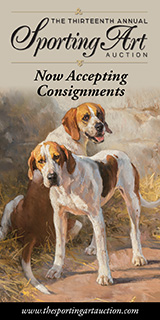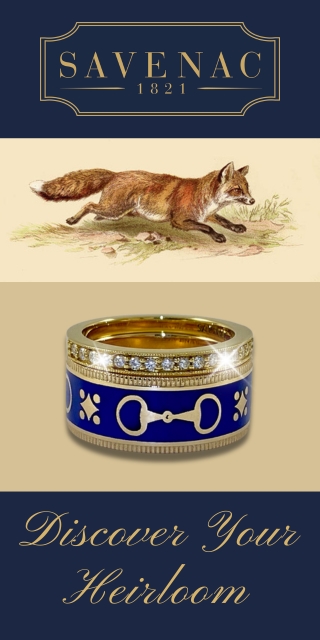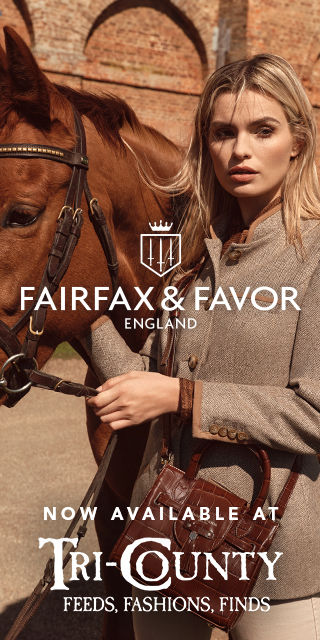Steven D. Price
The Turning Point
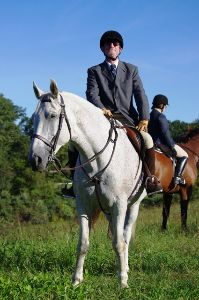 Steve Price and Frosty test their mettle at Old Dominion / Tom Sullivan photoI wouldn’t consider myself a real foxhunter.
Steve Price and Frosty test their mettle at Old Dominion / Tom Sullivan photoI wouldn’t consider myself a real foxhunter.
True, I’ve ridden to hounds several times, but always more like a spectator than a participant. This September, however, I had an awakening!
Thanks to the good graces of my friends Betsy Parker, proprietor of Hunter’s Rest in Flint Hill, and Norman Fine, of Millwood (and Foxhunting Life), I’ve been wending my way for the past four years from my New York City home to steep myself in semiannual Virginia equestrian sprees. Trail riding on Betsy’s school horses and on one of Norm’s hunters, Guitar, is the primary lure. In addition, Norm has taken me hunting with the Blue Ridge Hunt in the hilltopping field.
Breakfast in the Afternoon?
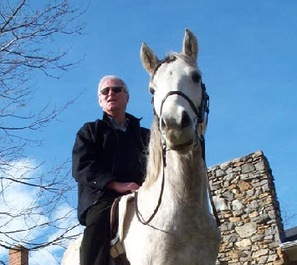 Andrew Clarke on his neice's pony, Happy, the latter being the only foxhunter in the photo“As a foxhunter husband, I've never heard why it's called a Hunt Breakfast when it's usually the afternoon when the hunt breakfast is served,” writes a mystified Andrew Clarke from Ontario.
Andrew Clarke on his neice's pony, Happy, the latter being the only foxhunter in the photo“As a foxhunter husband, I've never heard why it's called a Hunt Breakfast when it's usually the afternoon when the hunt breakfast is served,” writes a mystified Andrew Clarke from Ontario.
Surely there are many practicing foxhunters equally mystified by this question. For the answer we turned to our resident etymologist, author-editor Steven Price.
Recreating Your World
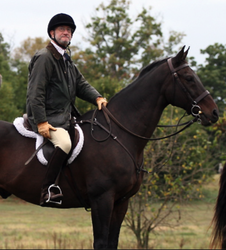 I used to think that the phrase “recreational rider” made the person sound like something of a second-class citizen among equestrians. “I foxhunt,” or “Endurance is my game,” or “My next horse show is in two weeks,” sounds far more exciting than “Oh, I ride around a ring and go out on trail rides now and again.”
I used to think that the phrase “recreational rider” made the person sound like something of a second-class citizen among equestrians. “I foxhunt,” or “Endurance is my game,” or “My next horse show is in two weeks,” sounds far more exciting than “Oh, I ride around a ring and go out on trail rides now and again.”
That’s not to say that such pursuits and disciplines aren’t more challenging, but by the same token plain ol’ pleasure riding shouldn’t be sneered at, a conclusion that came to mind when I spent a recent week with terminally horsey friends in Virginia.
The Origins of “Ratcatcher”
“Where did the term ‘ratcatcher’ come from?” asks Carol Riggs, whipper-in to the Red Mountain Foxhounds in North Carolina. “I know there are many, many ideas about this, but I would love to know the real history of the term ratcatcher.”
When it comes to etymology, Steven Price, the newest member of our Panel of Experts, is the first person I would think to consult. For Steven, words are beguiling toys to play on, to savor, to manipulate. He is the author or editor of thirty-five books, including the Lyon’s Press Horseman’s Dictionary. Here’s what he had to say:


